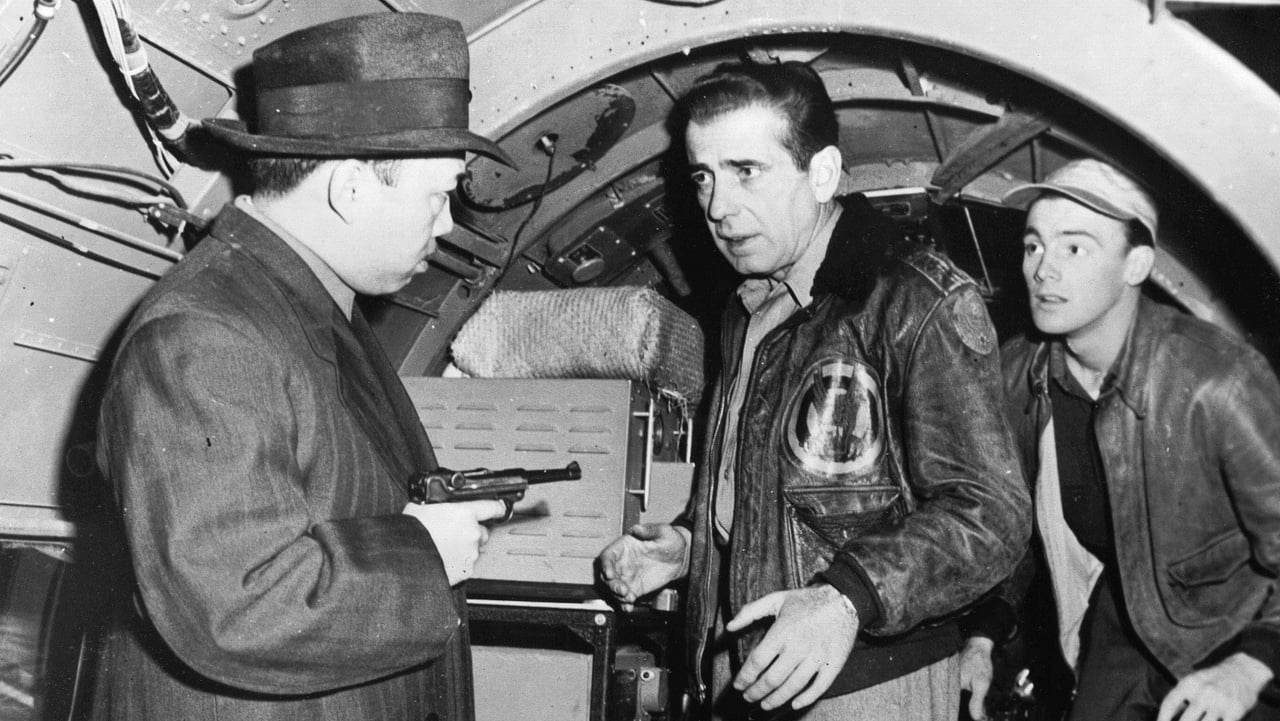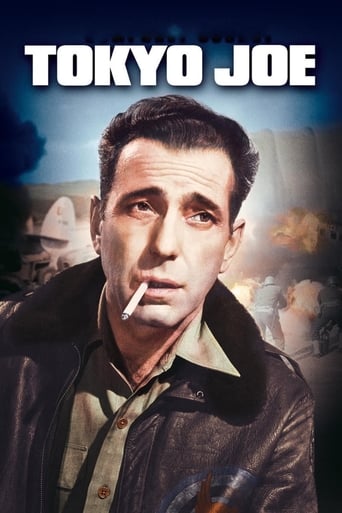

Bogart is a former nightclub owner who returns to postwar Japan to pick up his life with a wife (Florence Marly) he had deserted, only to find that she had remarried and was the mother of his seven-year-old daughter...In the ensuing complications, Bogart is placed in a position where he must smuggle some Japanese war criminals back into Japan or his daughter will be killed... Then the rest is resistance and heroism, courage and back-fighting. Humphrey Bogart cuts the character quite convincingly and gives us an interesting thriller.Conclusion - Humphrey Bogart is excellent in this film, but it has no other characters of note. This keeps Tokyo Joe from being a classic, in my opinion.
... View MoreThe setting for 'Tokyo Joe' is more interesting than the plot. It takes place in Japan not long after the second world war, during the American occupation. The country is being rebuilt, but times are still tough; at one point, we see Humphey Bogart's character toss a cigarette butt to the sidewalk and several people dive to retrieve it. In what is definitely one of Bogie's lesser vehicles, the story is confusing and at times it's hard to know exactly what Joe Barrett's (Bogart) motivations are. A colonel in WW2, Barrett had also owned a nightclub (shades of Casablanca) in Japan and returns after a few years to see what became of it. He finds it still operating but is frustrated at the amount of American red tape he must go through to re-establish himself as the owner. Then he discovers that his Russian-born wife Trina, whom he thought dead, is alive and remarried to a wealthy businessman named Mark Landis. At first, he is furious and determined to get Trina back, but when he discovers she has a daughter, his daughter no less, his mood softens. Then he meets with a shady Japanese underworld figure to front a small air freight company... Barrett will fly the plane and ask no questions about the cargo. The Japanese crime boss says they will export frozen frogs to North and South America. I'm serious. There is even a point later in the film when crates are being loaded onto a plane and one of them is dropped and comes open. We expect to see guns or drugs spilled out but sure enough, it's a bunch of frozen frogs. Barrett says to hurry and get them loaded before they spoil. Bleccch. Anyway, that's about all you need to know about the plot. Eventually, Barrett is ordered to bring three Japanese baddies, former bigwigs from the war, back to Japan from Korea so they can stir up trouble. An elaborate (well, fairly elaborate) sting operation is set up by American authorities and the plan is thwarted. I wonder how many Bogart pictures tried to copy 'Casablanca' either in part of in whole; 'Tokyo Joe' certainly would be one of them. There is the tragic former romance, the smoky nightclub and requisite mood music ('These Foolish Things' weaves in and out of the picture), the exotic locale and even a Paul Henreid-ish character in Alexander Knox's Mark Landis. Humphrey Bogart gives an adequate performance, lending credibility to scenes and plot devices that don't really deserve it. 'Tokyo Joe' is something of a curiosity, a time-capsule worth a look.
... View MoreHumphrey Bogart's lesser watched films are so often passed by because the standard for Bogart films is so incredibly high. Is this film as great as "To Have and Have Not"? No it isn't. On the other hand I guarantee you it is more sophisticated and interesting to watch than 90% of the films that came out last year. People often seem to over look the unique virtues of this film as an interesting film in history. Coming so shortly on the heels of World War 2 one would expect to find a certain amount of racism towards the Japanese and yet (unlike slightly later films like Sayonara) it is almost devoid of any remarks of that kind. Humphrey Bogart is a superb actor as always as is the rest of the cast. The plot is well written and the direction style suited well to the film. Over all I highly recommend that anyone who wants a sharp and fun movie check this one out just don't expect it to be the classic that "Treasure of the Sierra Madre" or that one of the many other "classic" films he made was. It is nonetheless worth watching and, to my mind at least, quite a bit better than the cookie cutter system they use for suspense films now.
... View MoreMinor Spoilers In a post-war Tokyo, with Japan totally dominated by the USA occupation forces, the American Joseph 'Joe' Barrett (Humphrey Bogart) lands in the Haneda Airforce Base, trying to return to his small business in the nightclub, cabaret, restaurant and casino Tokyo Joe. His former Japanese partner and friend Ito (Teru Shimada) has administrated and kept the place working during the war. When they meet each other, Ito tells him that Joe's wife Trina Pechinkov Landis (Florence Marly), supposed dead, is still alive. Joe goes to her address, and finds that Trina is married with the American Mark Landis (Alexander Knox), and she had a daughter with Joe called Anya (Lora Lee Michel). Joe decides to stay in Tokyo, trying to retrieve the love of Trina, but due to the difficulties in obtaining a visa, he opens a small transportation business, buying an old plane, hiring three pilots and accepting to transport the load of a powerful man, Baron Kimura (Sessue Hayakawa). However, he finds that the reason of being of the transportation was to smuggle stowaways. Further, Kimura has Trina in his hands, since she broadcasted for the Imperial Japanese government in the war to protect her daughter. Meanwhile, Kimura kidnaps Anya, to squeeze Joe. Pressed by the military forces, who wants him to leave the country, and by Kimura, Joe tries to save Anya from the hands of Kimura. Although not being a bad movie, "Tokyo Joe" is certainly the worst film of Humphrey Bogart that I have ever watched. One interesting point in this movie is the situation of Japan in those times, and the progress of this admirable people in some decades, being one of the most powerful nations of the world since the end of the last century. Anyway, I am a great fan of Humphrey Bogart, my favorite actor ever, and it was worthwhile for me to know this movie. My vote is six.Title (Brazil): "Tóquio Joe" (" Tokyo Joe")
... View More